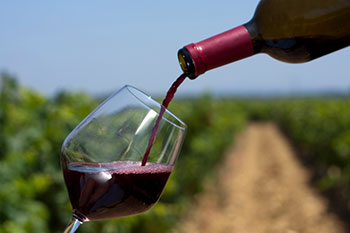More Health and Nutrition Bites
Related
Is Drinking Grape Juice the Same as Drinking Red Wine?
Is there a substitute for red wine? Perhaps grape juice made from grapes rather than concentrate? I do not drink alcohol at all and would not do so even for the benefits of red wine.
Sparkling Wines are (Also) Good for You
Moderate alcohol consumption is a part of the Mediterranean Diet, and several studies I've discussed in the past have linked alcohol specifically with a reduced risk of heart disease. We do know that artherosclerosis is actually a chronic, low-grade inflammation of the wall of the artery, and other studies suggest that alcohol may have an antiinflammatory effect, leading to that reduction in risk. Just what substance in alcohol has that effect is still uncertain.
Red Wine Good for Old and Young
"Free radicals" are natural and normal side effects of your body's processing of oxygen into energy. "Antioxidants" are those molecules that help your body remove those free radicals before they can contribute to such conditions as heart disease, stroke and diabetes. Researchers believe that as the body ages the process does not work as well, which may help explain why older people appear to be more likely to have these conditions.
Health & Nutrition Bites
Get the latest health and diet news - along with what you can do about it - sent to your Inbox once a week. Get Dr. Gourmet's Health and Nutrition Bites sent to you via email. Sign up now!
To help prevent diabetes, take... wine?

One of the interesting things about scientific research is that sometimes you start out to discover one thing and end up finding something else. Recently a group of scientists from the University of Minnesota set out to investigate whether a diet rich in flavonoids (an antioxidant found in fruits, vegetables, and beverages like tea or wine) might help reduce the risk of Type 2 diabetes (J Nutr 2006;136:3039-3045).
They utilized data from a large prospective study of postmenopausal women known as The Iowa Women's Health Study. At the beginning of the study over 40,000 women were asked about their height, weight, medication use, exercise, and other lifestyle habits as well as background questions. They were also given a questionnaire asking about their "usual diet", using a food questionnaire listing over 125 items. In five follow-up surveys sent over the next 18 years, the women were asked if they had been diagnosed with diabetes (among other follow-up items).
Dr. Nettleton and her colleagues then analyzed the diabetic women's diets and compared them with the non-diabetic women's diets. Unfortunately, they found that a woman's flavonoid intake had no relationship to her risk of Type 2 diabetes.
They noticed, however, that those women who reported drinking red wine seemed to have a lower risk of diabetes. In fact, those women who drank red wine at least once per week had a 16% reduced risk of diabetes compared to those who did not drink as regularly. Similar analysis of other alcoholic drinks produced similar results.
After further analysis, the researchers concluded that it was not the flavonoids in the red wine that had the protective effect - after all, the total amount of flavonoids had no effect on diabetes risk. The researchers in Minnesota concluded that further research is necessary on flavonoids, but their results on alcohol adds to the protective effects of alcohol that other researchers have seen (News Bite, 10/25/06).
What this means for you:
Alcohol appears to be good for you in moderation, but some medications may interact with it, so check with your doctor. If you drink, remember that all alcohol contains calories: about 100 calories per four-ounce glass of wine, about 150 calories per 12-ounce serving of beer, and about 75 calories per ounce of distilled spirits such as whiskey or vodka. Keep this in mind during those holiday parties!
First posted: December 1, 2006
